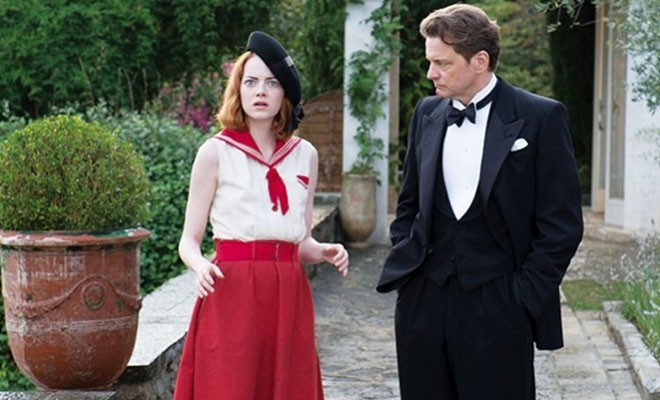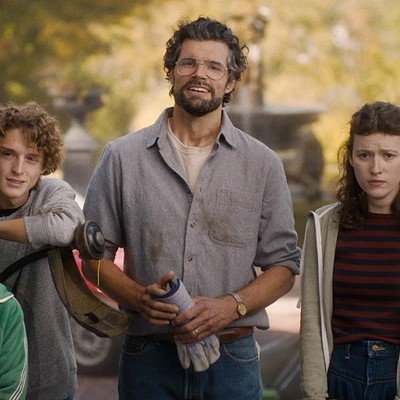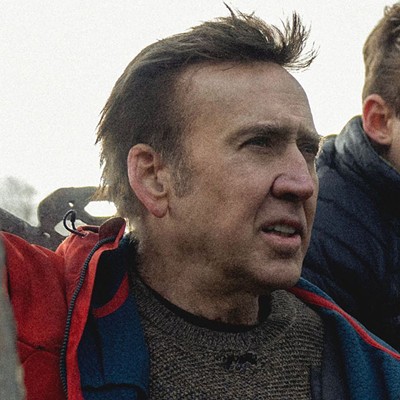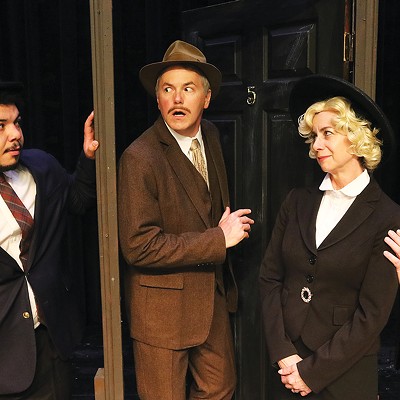Having made most of his modern films abroad, it comes as no surprise that the south of France is the locale for this examination of how adhering to a doctrine of faith and certainty in relation to one of cynicism and doubt effects how one looks at the world and in turn goes through life. The time is 1928 and master magician Stanley (Colin Firth) has just completed a successful European tour when he’s called on by an old friend, fellow illusionist and rival Howard (Simon McBurney), to enlist his help. Seems a wealthy American family he’s become acquainted with has taken in a young lady, Sophie (Emma Stone), and her mother, Mrs. Baker (Marcia Gay Harden), as they believe the former is a clairvoyant who’s able to reveal things about a person’s past that she has no way of knowing and can conduct séances in which she communes with the dead. Grace (Jacki Weaver) wants to be her benefactor. She’s sure Sophie can communicate with her dead husband. Grace’s son, Brice (Hamish Linklater), has fallen for Sophie, while his siblings, Olivia (Catherine McCormack) and George (Jeremy Shamos), are sure she’s a fraud and want her exposed, fearful that she might make off with their mother’s fortune.
Once Stanley and Sophie are brought together, the film heats up. The chemistry between Firth and Stone is immediate and obvious while the comedic timing they share helps bring Allen’s sharp dialogue to life. A hardened cynic who considers those who adore him as dim-witted rubes, the magician’s doubts begin to crumble once the comely seer begins revealing secrets about his life.
Firth is very, very good here in a role that’s littered with pitfalls. He convincingly and subtly conveys the fact that Stanley is being, at first reluctantly and then willingly swayed by the possibility that Sophie does possess some sort of mystical power. The moment of revelation – when a deep, dark secret of his Aunt Vanessa’s (Eileen Atkins) is revealed – is a genuinely funny and honest moment. Firth gives us a man aghast, motionless in the face of all his certainties being stripped away from him. It’s the turning point of the film, yet not the most difficult task the actor faces. It’s always been assumed that the lead character in any Allen movie was written by him, for him and many actors in the past have fallen into the trap of delivering their imitation of the filmmaker, replete with his trademark verbal pauses and physical ticks. (See Kenneth Branagh in Celebrity and Sean Penn in Sweet and Lowdown for the most egregious examples.) Firth avoids that trap here and while you recognize this as Allen-written dialogue due to the natural cadence of the lines, the actor makes the character his own, even when he’s forced to deliver long expository passages revealing Stanley’s feelings, a thankless job that often slows any production to a halt.
Stone is quite good as well, displaying a flair for broad comedy that’s refreshing. While there is an obvious age difference between her and Firth, making the romance that develops between them potentially awkward (Am I surprised? No, it’s a Woody Allen film!), the spunk the actress provides Sophie with conveys that they will be equally and well matched.
In the end, Moonlight is yet another take on one of Allen’s favorite themes, namely pondering if something greater than ourselves exists beyond or in the afterlife and what system of beliefs are needed to embrace them. What with Allen’s position as a skeptic being well known, the notion he puts forth in the film’s conclusion is refreshing and a bit surprising. Adhering to logic to debunk the possibility of the fantastic is a coward’s way out and while he or Stanley may not have any faith in their being a God-like being in the universe, they’re willing to embrace love, an emotion that defies all logic. As far as heartfelt, optimistic messages go, this is as good as it gets in an Allen film.
Contact Chuck Koplinski at [email protected].





















